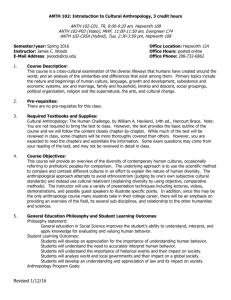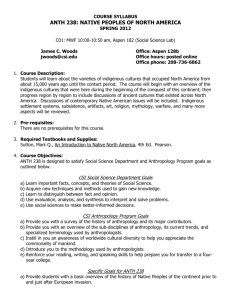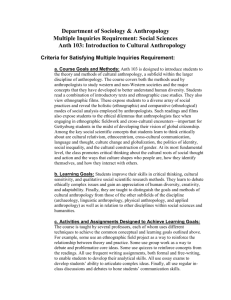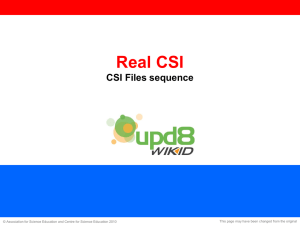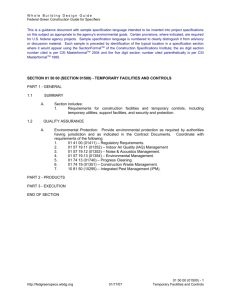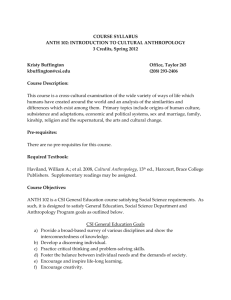ANTH 102: Cultural Anthropology (Jim Woods)
advertisement
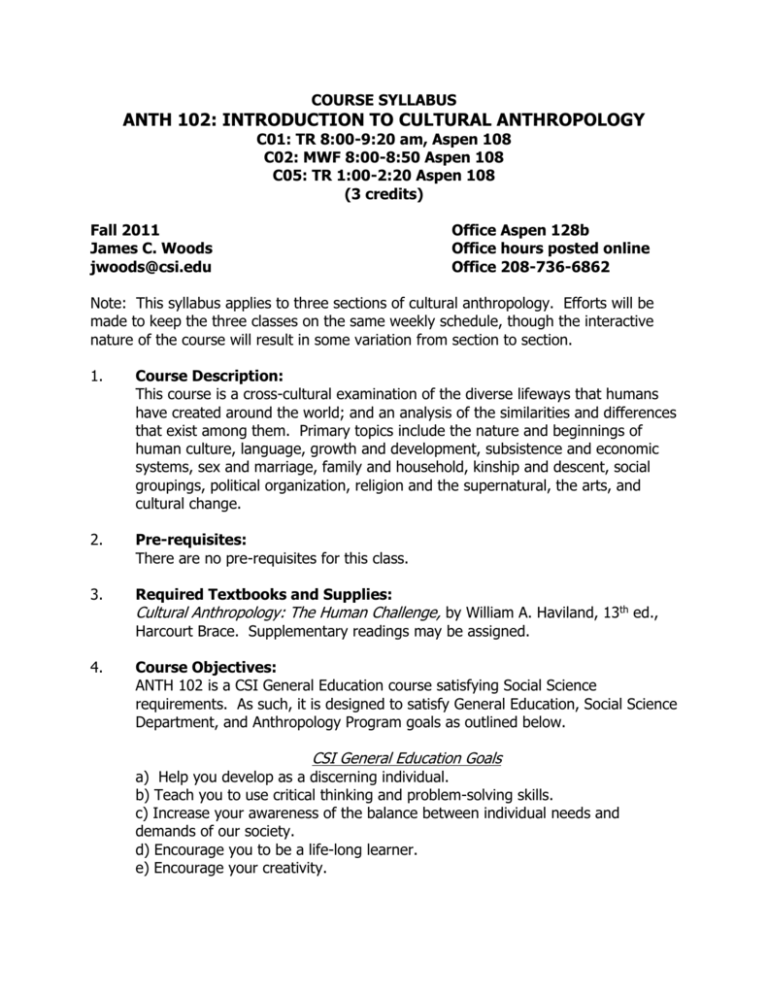
COURSE SYLLABUS ANTH 102: INTRODUCTION TO CULTURAL ANTHROPOLOGY C01: TR 8:00-9:20 am, Aspen 108 C02: MWF 8:00-8:50 Aspen 108 C05: TR 1:00-2:20 Aspen 108 (3 credits) Fall 2011 James C. Woods jwoods@csi.edu Office Aspen 128b Office hours posted online Office 208-736-6862 Note: This syllabus applies to three sections of cultural anthropology. Efforts will be made to keep the three classes on the same weekly schedule, though the interactive nature of the course will result in some variation from section to section. 1. Course Description: This course is a cross-cultural examination of the diverse lifeways that humans have created around the world; and an analysis of the similarities and differences that exist among them. Primary topics include the nature and beginnings of human culture, language, growth and development, subsistence and economic systems, sex and marriage, family and household, kinship and descent, social groupings, political organization, religion and the supernatural, the arts, and cultural change. 2. Pre-requisites: There are no pre-requisites for this class. 3. Required Textbooks and Supplies: Cultural Anthropology: The Human Challenge, by William A. Haviland, 13th ed., Harcourt Brace. Supplementary readings may be assigned. 4. Course Objectives: ANTH 102 is a CSI General Education course satisfying Social Science requirements. As such, it is designed to satisfy General Education, Social Science Department, and Anthropology Program goals as outlined below. CSI General Education Goals a) Help you develop as a discerning individual. b) Teach you to use critical thinking and problem-solving skills. c) Increase your awareness of the balance between individual needs and demands of our society. d) Encourage you to be a life-long learner. e) Encourage your creativity. CSI Social Science Department Goals a) Learn important facts, concepts, and theories of Social Science. b) Acquire new techniques and methods used to gain new knowledge. c) Learn to distinguish between fact and opinion. d) Use evaluation, analysis, and synthesis to interpret and solve problems. e) Use social sciences to make better-informed decisions. CSI Anthropology Program Goals a) Provide you with a survey of the history of anthropology and its major contributors. b) Provide you with an overview of the sub-disciplines of anthropology, its current trends, and specialized terminology used by anthropologists. c) Instill in you an awareness of worldwide cultural diversity to help you appreciate the commonality of mankind. d) Introduce you to the methodology used by anthropologists. e) Reinforce your reading, writing, and speaking skills to help prepare you for transfer to a four-year college. Specific Goals for ANTH 102 a) Provide you with a basic understanding of the historical development of the science of anthropology, and familiarize you with some of the disciplines major contributors. b) Help you distinguish between scientific and pseudoscientific explanations of human behavior. c) Help you learn contemporary theories used in cultural anthropology. d) Familiarize you with the terminology used in this discipline. e) Show you the fascinating diversity of human culture and help you see how your cultural practices relate to others worldwide. f) (for anthropology majors especially) Help prepare you to transfer to an upper division program elsewhere. 5. Outcomes Assessment: To accommodate different learning styles, a variety of assessment methods will be used in this class to determine if you are achieving the above course objectives. Five in-class short essay quizzes will be used to measure your knowledge of the history of archaeology, your familiarity with the disciplines major contributors, and your knowledge of the basic vocabulary of archaeology. Successful completion of several in-class projects will demonstrate your knowledge of the techniques used by anthropologists. You will be required to write summaries of each project. In-class discussions will be used to enhance and assess your ability to verbally communicate archaeological concepts to others. Near the end of the semester, you will be required to submit a paper wherein you create a fictitious but believable description of a recently-discovered culture. Lastly, a written comprehensive exam consisting of ten essay questions will be used to determine your ability to synthesize course material. 6. Policies and Procedures: a. Attendance policy: Attendance is required for this course. In accordance with CSI policies, school-sanctioned absences will not count against you if advance notice is provided. Please note the following new changes to the CSI attendance policy: 1-If you fail to show up the first week of school, you will be dropped by the instructor. You may qualify for a refund and you will not receive a “W” on your transcript. 2-A student can still withdraw the second week of school, but you will get a “W” on your transcript. You will not be eligible for a refund, and you cannot be reinstated. Faculty can drop students this week for “no show”. 3-During the third week and until November 12, 2011, students can withdraw from class but will receive a “W” on their transcript. After the second week, faculty cannot drop students, only issue letter grades. b. Class structure: Approximately one chapter will be reviewed each week. The instructor will provide a review of chapter readings and facilitate discussions using projected lecture notes and other visual aids. Videos, slide programs, and demonstrations will also be used when appropriate. An active interchange between all students and the instructor will be encouraged. c. Assignments: Many assignments will be completed during class time, there will be minimal homework other than reading and some on-line research activities. Some in-class assignments will require your response to activities during class that day, so these cannot be made up if you miss that class. You are required to read the textbook. Some questions on quizzes may come from the text without review in the classroom, and the text provides the basic organizational structure for the entire semester. It only takes an hour or so to read each chapter, PLEASE be responsible about this most important course requirement. You will also be required to write one paper for this class as described below. d. Plagiarism: Plagiarism and other forms of cheating are violations of the honesty policy found in the CSI General Catalog. Violators will receive a zero for the work in question. e. Cell phones: Please silence ringers on cell phones, save conversations or texting for after class. f. Personal musical devices: Please do not use musical devices during class time. g. Laptops, notebooks, etc: You may use computers for taking notes, but not for accessing any social media, or other non-class-related h. 7. activities. The lab has ample power sources and a fast wireless connection. Visitors: Lecture topics will not be adjusted for guests, some topics in this class may be unsuitable for children. Videos include some adult themes and images and are NOT rated using any standard film rating system. Grading Practices: a. Testing procedure: Five quizzes, 50 points each, 250 points total Six in-class exercises, 25 points each, 150 points total “New Culture” Paper, 250 points total Final exam, 250 points In-class participation, 100 points TOTAL MAXIMUM POINTS, 1000 (no extra credit) b. Grading Scale: you can earn a maximum of 1000 points and your final grade will be determined by the percentage of this total A=90100%, B=80-89%, C=70-79%, D=60-69%, F=less than 60%. Special note: It is the student’s responsibility to drop the course. A student may drop a course or all courses prior to the end of late registration (first Friday of the term) without it being recorded on the student’s official transcript. A student initiated drop after the late registration period is considered a withdrawal, and results in the grade of W. (Students may drop courses online until the end of the late registration period. In order to withdraw from one or more courses following late registration, a completed registration form is required. Instructions on the form indicate when a signature of instructor and/or Financial Aid advisor is required. The completed form may be submitted to Admissions & Records or any off-campus center.) Students may withdraw from courses until 75% of the course meetings have elapsed. No course may be withdrawn from after 75% of the course has elapsed. 8. New Culture Paper: You will be required to write a paper (approx 8 pages) due near the end of the semester that shows me your ability to synthesize the information learned in class. For this paper you will create a fictitious culture and describe some of its attributes using terms and concepts learned in class. This is a major portion of your grade so do not wait until the last minute to write your paper. You can start on it early in the semester and add to it as you learn more about world cultures. A detailed description of this project is available on the instructor’s web page. 9. CSI E-mail 9. On-line course evaluation: 10. Disabilities: 11. Topical Outline for the Course: The following schedule is provided as a general guide only. Some adjustments will be made to accommodate special class interests, weather cancellations, etc. It will be your responsibility to keep current with the readings. Please be aware that you are expected to read the assigned pages BEFORE the class meets so you can participate in discussions. In instances where a student’s final grade is between two letter grades, class participation will determine the earned grade. Since email is the primary source of written communication with students, all registered CSI students get a college email account. Student e-mail addresses have the following format: <address>@eaglemail.csi.edu where <address> is a name selected by the student as a part of activating his/her account. Students activate their accounts and check their CSI email online at http://eaglemail.csi.edu. Instructors and various offices send messages to these student accounts. Students must check their CSI e-mail accounts regularly to avoid missing important messages and deadlines. At the beginning of each semester free training sessions are offered to students who need help in using their accounts. To help instructors continually improve courses, students are strongly encouraged to go online to http://evaluation.csi.edu and complete anonymous evaluations which open two weeks before the end of the course and close the last day of class. When students enter the site, they find evaluations for their enrolled courses. Thank you for this valuable input! Any student with a documented disability may be eligible for reasonable accommodations. To determine eligibility and secure services, students should contact Student Disability Services at their first opportunity after registration for a class(es). Student Disability Services is located on the second floor of the Taylor Building on the Twin Falls Campus. 208.732.6260 or e-mail Scott Scholes, sscholes@csi.edu. Dates* Aug 22-26 Aug 29-Sept 2 Sept 5 Sept 6-9 Sept 12-16 Sept 19-23 Sept 26-30 Oct 3-7 Oct 10 Oct 11-14 Oct 17-21 Oct 24-28 Oct 31-Nov 4 Nov 7-10 Nov 11 Nov 14-18 Nov 21-22 Nov 23-25 Nov 28-30 Dec 2 Dec 1-7 Dec 8 and 9 Dec 13 (Tue) Dec 15 (Thur) Dec 15 (Thur) Ch Lecture/Discussion Topics (follows text) 1 The Essence of Anthropology 2 Characteristics of Culture No school, Labor day 3 Ethnographic Research: History, Methods, Theories 4 Becoming Human: Origin and Diversity of Our Species 5 Language and Communication 6 Classification and Analysis of Artifacts 7 Patterns of Subsistence No school, Columbus Day 8 Economic Systems 9 Sex, Marriage, and Family 10 Kinship and Descent 11 Groupings by Sex, Age, Common Interest, and Class 12 Politics, Power, and Violence No school, Veteran’s Day 13 Spirituality, Religion, and the Supernatural 14 The Arts No school, Thanksgiving Vacation The Arts (cont.) “New Culture” paper due 15 Will combine last two chapters: Processes of Change and Global 16 Challenges, Local Responses, and the Role of Anthropology Semester Review ANTH 102-C02 Final Exam, 8-10 AM ANTH 102-C01 Final Exam, 8-10 AM ANTH 102-C05 Final Exam, noon – 2 PM *Dates may change due to the informal nature of class discussions, related world events worthy of class discussion, uncontrollable cancellations due to weather, etc. Special Note to all ANTH 102 students: Please feel free to stop by my office anytime during my office hours to chat. I am especially interested in any of your experiences in life that I can use to enhance my teaching of this particular class (travels to other places, friends or family in other countries, experiences with other cultures, etc.). Revised 8/11
